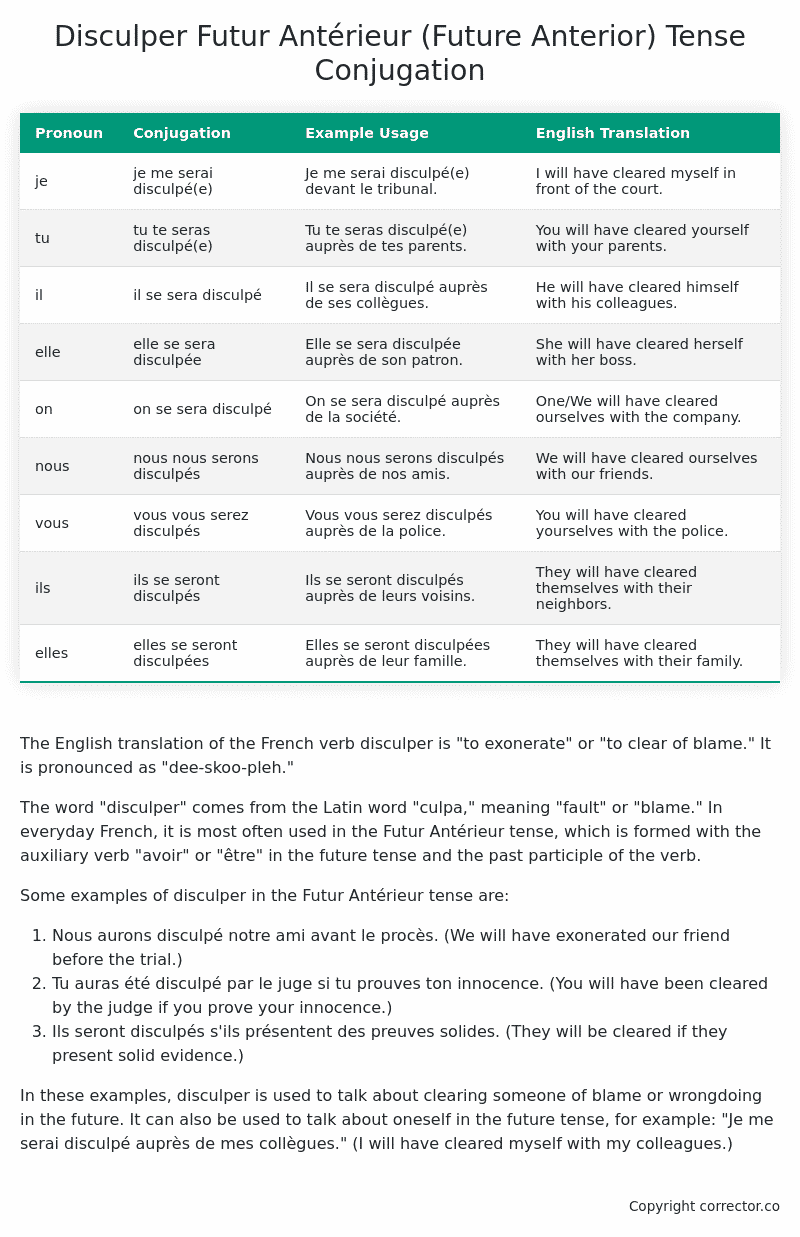Futur Antérieur (Future Anterior) Tense Conjugation of the French Verb disculper
Introduction to the verb disculper
The English translation of the French verb disculper is “to exonerate” or “to clear of blame.” It is pronounced as “dee-skoo-pleh.”
The word “disculper” comes from the Latin word “culpa,” meaning “fault” or “blame.” In everyday French, it is most often used in the Futur Antérieur tense, which is formed with the auxiliary verb “avoir” or “être” in the future tense and the past participle of the verb.
Some examples of disculper in the Futur Antérieur tense are:
- Nous aurons disculpé notre ami avant le procès. (We will have exonerated our friend before the trial.)
- Tu auras été disculpé par le juge si tu prouves ton innocence. (You will have been cleared by the judge if you prove your innocence.)
- Ils seront disculpés s’ils présentent des preuves solides. (They will be cleared if they present solid evidence.)
In these examples, disculper is used to talk about clearing someone of blame or wrongdoing in the future. It can also be used to talk about oneself in the future tense, for example: “Je me serai disculpé auprès de mes collègues.” (I will have cleared myself with my colleagues.)
Table of the Futur Antérieur (Future Anterior) Tense Conjugation of disculper
| Pronoun | Conjugation | Example Usage | English Translation |
|---|---|---|---|
| je | je me serai disculpé(e) | Je me serai disculpé(e) devant le tribunal. | I will have cleared myself in front of the court. |
| tu | tu te seras disculpé(e) | Tu te seras disculpé(e) auprès de tes parents. | You will have cleared yourself with your parents. |
| il | il se sera disculpé | Il se sera disculpé auprès de ses collègues. | He will have cleared himself with his colleagues. |
| elle | elle se sera disculpée | Elle se sera disculpée auprès de son patron. | She will have cleared herself with her boss. |
| on | on se sera disculpé | On se sera disculpé auprès de la société. | One/We will have cleared ourselves with the company. |
| nous | nous nous serons disculpés | Nous nous serons disculpés auprès de nos amis. | We will have cleared ourselves with our friends. |
| vous | vous vous serez disculpés | Vous vous serez disculpés auprès de la police. | You will have cleared yourselves with the police. |
| ils | ils se seront disculpés | Ils se seront disculpés auprès de leurs voisins. | They will have cleared themselves with their neighbors. |
| elles | elles se seront disculpées | Elles se seront disculpées auprès de leur famille. | They will have cleared themselves with their family. |
Other Conjugations for Disculper.
Le Present (Present Tense) Conjugation of the French Verb disculper
Imparfait (Imperfect) Tense Conjugation of the French Verb disculper
Passé Simple (Simple Past) Tense Conjugation of the French Verb disculper
Passé Composé (Present Perfect) Tense Conjugation of the French Verb disculper
Futur Simple (Simple Future) Tense Conjugation of the French Verb disculper
Futur Proche (Near Future) Tense Conjugation of the French Verb disculper
Plus-que-parfait (Pluperfect) Tense Conjugation of the French Verb disculper
Passé Antérieur (Past Anterior) Tense Conjugation of the French Verb disculper
Futur Antérieur (Future Anterior) Tense Conjugation of the French Verb disculper (this article)
Subjonctif Présent (Subjunctive Present) Tense Conjugation of the French Verb disculper
Subjonctif Passé (Subjunctive Past) Tense Conjugation of the French Verb disculper
Subjonctif Imparfait (Subjunctive Imperfect) Tense Conjugation of the French Verb disculper
Subjonctif Plus-que-parfait (Subjunctive Pluperfect) Tense Conjugation of the French Verb disculper
Conditionnel Présent (Conditional Present) Tense Conjugation of the French Verb disculper
Conditionnel Passé (Conditional Past) Tense Conjugation of the French Verb disculper
L’impératif Présent (Imperative Present) Tense Conjugation of the French Verb disculper
L’infinitif Présent (Infinitive Present) Tense Conjugation of the French Verb disculper
Struggling with French verbs or the language in general? Why not use our free French Grammar Checker – no registration required!
Get a FREE Download Study Sheet of this Conjugation 🔥
Simply right click the image below, click “save image” and get your free reference for the disculper Futur Antérieur tense conjugation!

Disculper – About the French Futur Antérieur (Future Anterior) Tense
Construction
Common Everyday Usage Patterns
Interactions with Other Tenses
For example
Summary
I hope you enjoyed this article on the verb disculper. Still in a learning mood? Check out another TOTALLY random French verb conjugation!


